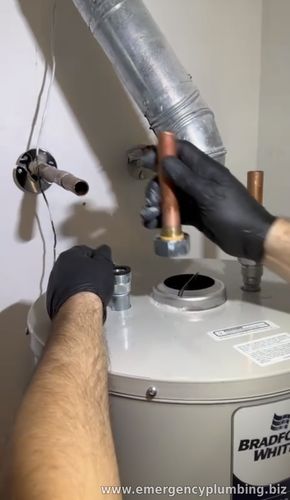0:01 AM Understanding Water Heater Installation | |
When it comes to installing a water heater, one crucial element that often goes unnoticed but plays a significant role in the system's longevity and performance is the dialectic union.
Understanding Water Heater Installation
Whether you're replacing an old unit or installing a new one, proper installation is key to ensuring optimal performance and safety. A professional installation by Emergency Plumbing, plumber near me in Highland Park and local communities not only guarantees compliance with building codes but also minimizes the risk of leaks, malfunctions, and costly repairs down the line.
The Role of Dialectic Unions
A dialectic union is a fitting that joins two different metals, typically copper and steel, without causing galvanic corrosion. Galvanic corrosion occurs when two dissimilar metals are in contact with each other in the presence of an electrolyte, such as water. In the context of water heaters, the combination of metal components and water makes galvanic corrosion a potential concern.
Why You Need a Dialectic Union
1. Prevents Corrosion: The primary purpose of a dialectic union is to prevent corrosion in the water heater system. By separating the dissimilar metals, it interrupts the electrochemical process that leads to corrosion, extending the lifespan of the water heater and its components. 2. Ensures Longevity: Corrosion can significantly shorten the lifespan of a water heater. By incorporating a dialectic union into the installation, homeowners can protect their investment and avoid premature failure of the unit. 3. Maintains Efficiency: Corrosion buildup inside the water heater can reduce its efficiency by hindering heat transfer and restricting water flow. With a dialectic union in place, the internal components remain free from corrosion, allowing the heater to operate at peak efficiency. 4.Prevents Leaks: Corrosion can weaken the connections between pipes and fittings, leading to leaks. By mitigating the risk of corrosion, a dialectic union helps maintain the integrity of the water heater system, reducing the likelihood of costly leaks and water damage. 5.Compliance with Codes: Many building codes and plumbing regulations mandate the use of dialectic unions in water heater installations to prevent corrosion-related issues. By adhering to these codes, homeowners can ensure the safety and reliability of their water heater system.
Installation Process
Installing a dialectic union is a relatively straightforward process that typically occurs during the initial installation of the water heater. Here's a basic overview of the installation process: Drain the old water heater, disconnect. 1. Prepare the Pipes: Clean and deburr the ends of the copper and steel pipes that will be connected using the dialectic union. 2. Apply Thread Sealant: Apply thread sealant to the threads of the pipes to ensure a tight, leak-free seal. 3. Assemble the Union: Thread the dialectic union onto one of the pipes, ensuring that it is securely tightened. 4. Connect the Pipes: Join the two pipes together by threading the second pipe into the other end of the dialectic union. Tighten the connection securely. Gas and water line modifications to fit the size of the new water heater. 5. Test for Leaks: Once the union is installed, test the connections for leaks by pressurizing the system and inspecting for any signs of water .
Don't Let a Cold Shower Surprise You! We're your local Highland Park plumber near me for all your water heater needs. Whether your current heater needs a repair or it's time for a brand new one, we can help. We install both gas and electric water heaters, in traditional tank storage and water-on-demand options, with sizes to fit your needs (40, 50, and 75 gallons). Call Emergency Plumbing today ! No delay !
| |
⏰ Dispatcher support 24/7
📞 224-754-1984CALL ☎ Subscribe 👆 FORUM 🗣
North Shore, Northwest suburbs of Chicago, IL
Next & Previous posts
| Total comments: 0 | |


